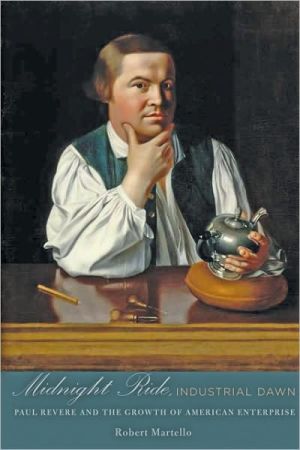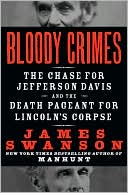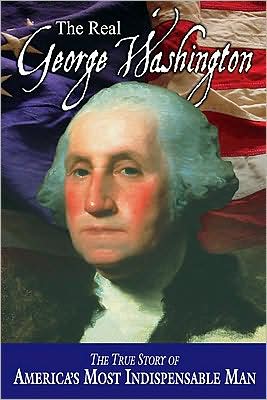Midnight Ride, Industrial Dawn: Paul Revere and the Growth of American Enterprise
Paul Revere's ride to warn the colonial militia of the British march on Lexington and Concord is a legendary contribution to the American Revolution. Midnight Ride, Industrial Dawn reveals another side of this American hero's life, that of a transformational entrepreneur instrumental in the industrial revolution.\ Robert Martello combines a biographical examination of Revere with a probing study of the new nation's business and technological climate. A silversmith prior to the Revolution and...
Search in google:
Paul Revere's ride to warn the colonial militia of the British march on Lexington and Concord is a legendary contribution to the American Revolution. Midnight Ride, Industrial Dawn reveals another side of this American hero's life, that of a transformational entrepreneur instrumental in the industrial revolution.Robert Martello combines a biographical examination of Revere with a probing study of the new nation's business and technological climate. A silversmith prior to the Revolution and heralded for his patriotism during the war, Revere aspired to higher social status within the fledgling United States. To that end, he shifted away from artisan silversmithing toward larger, more involved manufacturing ventures such as ironworking, bronze casting, and copper sheet rolling. Drawing extensively on the Revere Family Papers, Martello explores Revere's vibrant career successes and failures, social networks, business practices, and the groundbreaking metallurgical technologies he developed and employed. Revere's commercial ventures epitomized what Martello terms proto-industrialization, a transitional state between craft work and mass manufacture that characterizes the broader, fast-changing landscape of the American economy. Martello uses Revere as a lens to view the social, economic, and technological milieu of early America while demonstrating Revere's pivotal role in both the American Revolution and the rise of industrial America.Original and well told, this account argues that the greatest patriotic contribution of America's Midnight Rider was his work in helping the nation develop from a craft to an industrial economy.
Introduction 1Paul Revere: Patriot, Artisan, Manager, and Recordkeeper 4Craft, Industry, and the Proto-industry Transition 61 Artisan, Silversmith, and Businessman (1754-1775) 11Growing Up in Colonial America 15Paul Revere: Artisan 20Paul Revere: Silversmith 36Paul Revere: Networker and Businessman 522 Patriot, Soldier, and Handyman of the Revolution (1775-1783) 61Patriot Resistance and the Role of Artisans 63"Listen my children and you shall hear..." 75After the Ride: Martial Longings and the Pursuit of Honor 78Mechanic for the Revolution: Engraving, Mill Design, and Cannon Casting 833 Mercantile Ambitions and a New Look at Silver (1783-1789) 91Quest for Gentility: The Would-be Merchant 94Return to Silver: Products, Methods, and the Shift toward Standardization 102Technological Advances: The Rolling Mill and Sheet Silver 107Labor Practices: Combining Old and New 1114 To Run a "Furnass": The Iron Years (1788-1792) 119Iron from Antiquity to America 122Revere the Founder: Climbing the Iron Learning Curve 130Technology: Equipment, Production Methods, and Products 139Labor in the Post-Artisan Mode 142Raw Material Availability and Environmental Impacts 146Capital Concerns: Sales, Profits, and Management 1515 Bells, Cannon, and Malleable Copper (1792-1801) 156Becoming a Bell Maker: An Art and a Science 160Cannon Founding and Government Contracting 173Malleable Copper: Bolts, Spikes, and Technical Experimentation 1876 Paul Revere's Last Ride: The Road to Rolling Copper (1798-1801) 204The Early Federal Government and Benjamin Stoddert's Navy 206The Tentative Growth of American Manufacturing 214The Search for Sheathing 219The Road to Rolling Copper 2257 The Onset of Industrial Capitalism: Managerial and Labor Adaptations (1802-1811) 245America's Transition to Industrial Capitalism 247Investment Capital, Managerial Practices, and the Role of Government 253The Changing Face of Labor 2738 Becoming Industrial: Technological Innovations and Environmental Implications (1802-1811) 283Technical Practices and Improvements 285Standardization and a Tour of Revere's Product Lines 296Revere and the Environment: Raw Material Shortages and Procurement Strategies 307Conclusion 324Industrial Dawn: Proto-industry Revisited 332Tools of the Trade: Components of Revere's Success 335The Pursuit of Happiness: Revere's Goals and Identity 340Acknowledgments 345Appendixes1 Major Events in the Narratives of Paul Revere and America 3492 Four Proto-industrial Production Factors and Major Linkages 3513 Prevalent Craft and Industrial Practices in the Proto-industrial Period 3524 Selected Revere Engravings 3545 Furnace Startup Expenses for 1787-1788 3556 April 1796 Payments to Faxon 3567 Revere's Second Letter to Benjamin Stoddert, February 26, 1800 3578 Employee Salaries, 1802-1806 3599 Typical Stages in the Growth of a Large Technological System 360Notes 361Index 413
\ ChoiceMartello succeeds superbly in using Paul Revere as a lens to view the social, economic, and technological landscape of early America... Revere's adept transitions are matched only by Martello's adept retelling of them. Highly recommended.\ \ \ \ \ Times Literary SupplementRevere sensed that he was living in a time of unprecedented opportunity, and unlike some contemporaries who returned to small shops, he moved quickly from artisan to manager, from craftsman to industrialist. As Martello demonstrates in this fascinating study, the transition was not easy.\ \ \ Common-PlaceMartello's account of Revere's life is a welcome addition to the literature on American industry and on the founding fathers.\ — Lawrence A. Peskin\ \ \ \ \ \ Journal of American HistoryEngagingly written.\ \ \ \ \ Technology and CultureMartello's fine study is enriched by his attention to the raw materials, labor practices and customs, capital requirements, and technological dimensions that framed each of Revere's ventures.\ — Leonard N. Rosenband\ \ \ \ \ \ Enterprise and Society[An] important new study.\ — Edward Gray\ \ \ \ \ \ Register of the Kentucky Historical SocietyHe provides a deft discussion of technological transfer and shows how imitation and innovation were inextricably connected.\ — Neil L. York\ \ \ \ \ \ The New England Journal[A]finely crafted book that succeeds on several levels...nuanced, and technologically thorough\ — James McWilliams\ \ \








